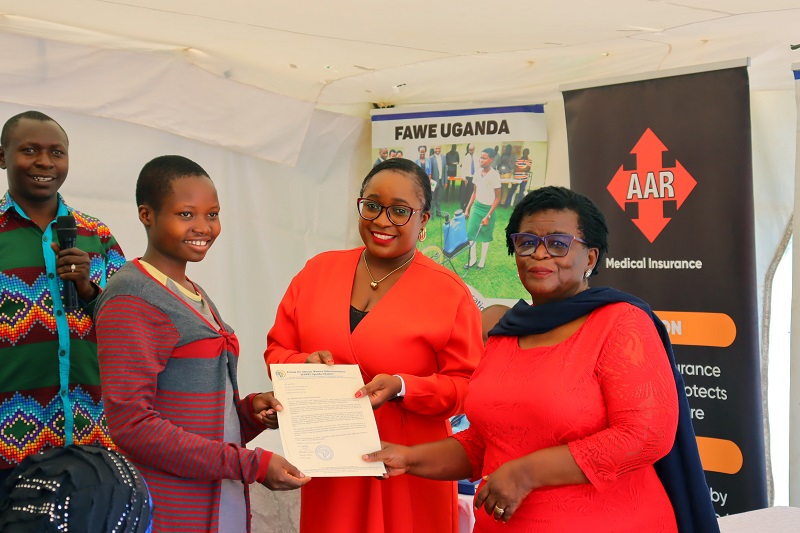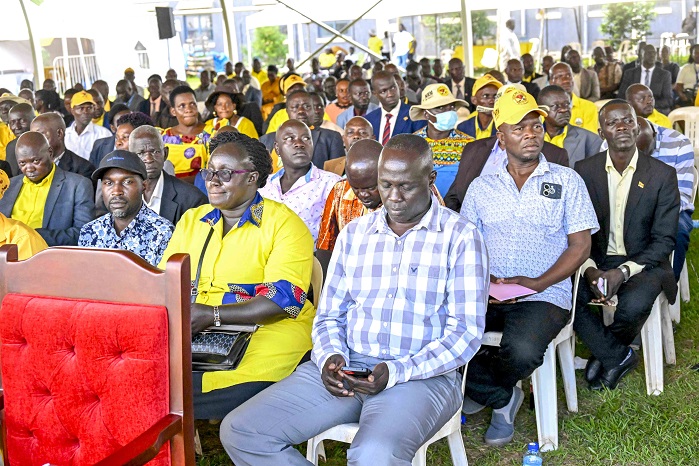
Rose Izizinga (R), a member of the Education Service Commission, Leila Kamulegeya, the AAR PRO (M), a benefiting student and Calvin Okello, the Education Coordinator of the Federation of African Women Educationalists (FAWE) (L) handing over a scholarship award letter to one of the beneficiaries at their Bukoto office recently
Kampala, Uganda I HABARI DAILY I As it intensifies efforts to retain science teachers and make them remain in the profession, the government of Uganda recently announced enhanced remuneration for science teachers. However, concerns have been raised over the potential effectiveness of this initiative due to a significant regulatory gap.
Officials from the Ministry of Public Service have disclosed that arts teachers in secondary schools will only receive the same salary as science teachers by 2027, raising questions about the sustainability and fairness of the program.
Rose Izizinga, a respected educationalist and member of the Education Service Commission, expressed her views on the matter. While acknowledging the importance of promoting science education to foster the growth of future scientists, Izizinga cautioned that the current initiative could be susceptible to abuse and may result in underperformance.
She emphasized the need for performance tracking and the establishment of targets to ensure that the increased remuneration is matched with commensurate work output. Without addressing this regulatory gap, she warned of an increased failure rate in science education.
Izizinga made these remarks during the Scholarship Award Ceremony organized by the Federation of African Women Educationalists (FAWE) Uganda Chapter. The event celebrated 37 beneficiaries, including university, ‘A’ level, and ‘O’ level students, who were awarded one-year scholarships each worth a total of sh70m. Drawing from her 37 years of experience as a teacher in government schools and her six-year tenure as the head of Makerere College School, Izizinga stressed that any future salary enhancement for arts teachers should align with the workload assigned to them.
Addressing concerns about potential division and demoralization among arts teachers, Izizinga urged restraint, stating that the government must strive to strike a balance in salary enhancement for all civil servants. Furthermore, she called upon both the government and the private sector to adopt gender-inclusive policies and observe gender balance to create an accommodating work environment for women. Izizinga highlighted the challenges faced by women in leadership positions, emphasizing the need to support female staff in taking up responsibilities while managing their roles as young mothers.
Suzan Opok Tumusiime, the FAWE Uganda Country Director, provided insights into the organization’s scholarship program. Last year, FAWE Uganda raised sh165m through a fundraising dinner held in commemoration of their 25 years of service. This funding is now being utilized to support the scholarship scheme, which aims to empower young women who have been disproportionately affected by the COVID-19 pandemic.
Tumusiime shared disturbing statistics from a study conducted by FAWE, revealing a 25% increase in the country’s pregnancy rate within three months of the pandemic’s onset. Shockingly, the study also indicated a 366.5% surge in pregnancies among girls aged 10 to 14, exposing them to abuse by those who should have protected them. The scholarship program seeks to uplift these girls through educational support.
Calvin Okello, the FAWE Uganda Education Coordinator, explained that the organization focuses on supporting finalists at the ‘O’ and ‘A’ levels, as well as university students, to prevent them from dropping out during their crucial final year. The beneficiaries of the scholarships included students from esteemed institutions such as Makerere University, MUBS, Gulu, and Cavendish universities, among others.
The implementation of the government’s science education initiative, while aiming to address the need for qualified science teachers, has faced criticism due to the unequal treatment of arts teachers and potential challenges in ensuring performance. As stakeholders continue to engage in dialogue, it is crucial to establish robust mechanisms that ensure fairness, accountability, and optimal educational outcomes for all students in Uganda.




